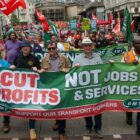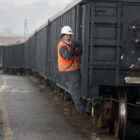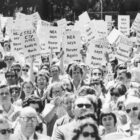
Last month, roughly 40,000 UK rail workers with the National Union of Rail, Maritime, and Transport Workers (RMT) went on strike for three days, bringing major portions of the British rail system to a halt in a historic show of collective strength. This week, after receiving a contract offer from state-owned Network Rail that union leaders described as “paltry,” the RMT announced that workers at Network Rail and the train operating companies will engage in another day of strike action on Wednesday, July 27. With these strikes, and in the ongoing negotiations, workers are fighting for livable wages at a time when the cost of living is spiraling out of control and corporate executives and shareholders are stuffing their pockets with cash. As Adam Bychawski writes, “Train companies paid out nearly £800m to shareholders last year before telling rail unions that employees must take a real-terms pay cut for them to stay afloat.” But workers are fighting for much more; they are fighting against years of austerity policies and corporate profit-generating schemes that have led to deteriorating working conditions and quality of service on the rails; they are fighting against further job losses for the sake of “modernization”‘; and they are fighting for better, safer, more accessible, and well-staffed rail services for the people who depend on them.
In this special panel episode, we speak with four rail workers and RMT members/officers—Mel Mullings, Clayton Clive, Cat Cray, and Gaz Jackson—about the strike and the importance of workers around the world standing in solidarity with strikers.
Additional links/info below…











